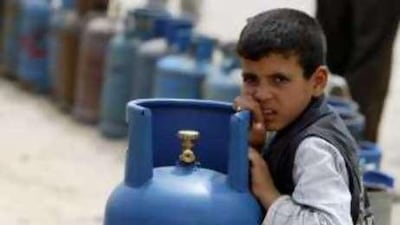BG Group, the British gas producer, has resumed talks with Israel over developing a gas field off the coast of Gaza, reviving plans to exploit the territory's only significant energy resource. But while the stalled project may be inching closer to fruition, it still faces extraordinary obstacles because of mistrust between the two neighbours and disagreements over price.
"I expect it to be quite a long and drawn-out process," said Frank Chapman, the chief executive of BG, during a conference call to discuss the company's second-quarter results. "The barriers relate to realism on the part of the Israelis regarding the value of gas today." The Gaza Marine Field in the eastern Mediterranean Sea lies about 30 kilometres off the coast and contains around 1.3 trillion cubic feet of reserves, worth an estimated US$4 billion (Dh14.7bn), making it a significant potential source of exports and foreign currency for the cash-starved Palestinian Authority. The project would take about four years to develop.
BG won a majority stake in a concession to develop the Gaza field in 2000 and five years later was pursuing plans to sell the gas to Egypt. Pressure from Tony Blair, then the prime minister of Britain, led the company to reopen earlier failed negotiations with Israel for a pipeline development that would land the gas at Ashqelon, a southern Israel coastal city with a petroleum refinery. Israel broke off discussions at a time of heightened tensions during the Palestinian Intifada.
But now Israel urgently needs gas to fuel an economy far bigger and more industrially advanced than that in the Palestinian territories. BG, which discovered the Gaza field, also struck gas off Israel's coast in the 1990s but those fields are smaller and have already been producing for several years. Israel recently began importing gas from Egypt to supplement its offshore supplies. But the gas trade with a traditional political enemy is highly controversial in Egypt, causing concerns in Israel about its vulnerability to interruptions.
This gives the Jewish state a strong incentive for seeking to develop alternative sources of gas. Stacked up against this is its political reluctance to provide a source of funds for Hamas, following the pro-Intifada movement's 2006 election victory. BG holds a 90 per cent interest in the project to develop the Gaza field. That could drop to 60 per cent if the Palestinian Authority, which controls project licensing, exercises its option to take a stake in the development. The Palestinian Investment Fund (PIF), a financial holding company owned mainly by independent Palestinian shareholders, holds 10 per cent of the Gaza Marine project.
Under the terms of the proposed deal with Israel, the Gaza field would supply Israel with about 10 per cent of its annual energy requirements and would generate roughly $1bn of revenue for the PIF - currently the primary vehicle for private investment in Palestinian infrastructure. Other terms would need to include Israeli assurances of uninterrupted gas supplies to Gaza and the West Bank and an uninterrupted flow of funds to Palestinian stakeholders, but sceptics wonder just how ironclad such assurances would be.
The project's other big stumbling block is Israel's reluctance to pay anything close to market price for the Palestinian gas. "We have not been able to agree on a suitable economic framework that would support development of the gas field and the cost of imports into Israel," a BG spokesman said. "Equally, there has not been very much engagement between the governments of Israel and Gaza on issues such as fund flow and assurances of gas supply to Gaza," she said. "If BG is to develop the field, these issues have to be resolved."
In January, frustrated over the lack of progress, BG threatened to close its Israeli office near Tel Aviv and to reopen negotiations with Egypt. But BG said on Thursday it was not in talks with Cairo over alternative markets for the Palestinian gas, which could be liquefied at Egyptian facilities and shipped to Europe or North America. That may be because Israel still exerts significant military control over Gaza's coastal waters under "interim" measures introduced in the 1990s.
@Email:tcarlisle@thenational.ae

